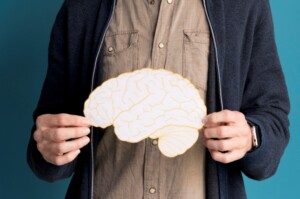Obesity damages the brain, no matter how “confident” a fat positivity influencer feels “living in a larger body.”
The brain is not exempt from the harmful effects of being fat.
The mounting scientific evidence for this simply can no longer be swept under that proverbial rug.
Plain and simple, obesity has a negative effect on cognitive function.
Yet More Research Is In: Obesity Harms the Brain
Professor Anqi QIU from the Department of Health Technology and Informatics at the Hong Kong Polytechnic University, has led research focused on how different weight patterns influence brain structure and cognitive abilities in adults.
While previous studies have linked obesity to cognitive decline and changes in the brain, many of them relied on one-time measurements.
This makes it challenging to tell whether or not long-term weight issues have different effects than do short-term ones.
Professor QIU’s study investigated long-term weight data from the UK Biobank.
Repeated measurements were used to study how different body weight patterns relate to brain and cognitive health in people during midlife and older age.
What are weight patterns?
The study identified five types of weight patterns: low-stable, moderate-stable, high-stable, increasing and decreasing.
The research then examined how each of these patterns affected brain structure, how different parts of the brain communicate with each other and how well individuals performed on cognitive tasks.
The Not So Surprising Results
Decreasing weight. This group showed brain and cognitive results similar to the low-stable group, suggesting that intentional weight loss may help limit harmful effects on the brain.
Increasing, moderate-stable, high-stable. These groups experienced more serious issues.
The increasing group – people whose weight was steadily on the rise over a period of time – showed changes beginning in brain areas linked to emotion and motivation.
The moderate-stable group showed further effects in regions related to attention and memory.
The high-stable group (significant obesity maintained over a period of time) displayed the most widespread and severe problems, affecting many areas of the brain and leading to lower performance in thinking tasks.
To put this bluntly, being very fat harms brain health.
And why shouldn’t it? Morbid obesity is very dangerous for organs such as the heart, liver and kidneys, and is destructive to the cardiovascular and musculoskeletal systems.
The brain is an organ, too, and it’s part of the body’s neurological system.
- Why should this complex organ be exempt from the dangers of obesity?
- To deny this would be to deny that the sun rises every morning.
Conclusions
This research shows that long-term weight gain or sustained obesity may speed up brain aging and increase the risk of age-related decline.
It also points to the possibility of using long-term weight patterns as a signal for potential brain health issues.
Social Media
We literally have people promoting a condition that research – and not just this particular study – clearly shows is detrimental to cognitive function.
It’s one thing to work on feeling confident regardless of size.
We ALL should strive to feel self-confident and have high self-worth, no matter what we look like.
Certainly, anyone with reasonable sense would be onboard with this approach in life.
But this approach is entirely different from those TikTok and Instagram influencers (who may have millions of followers) who keep preaching that being very heavy (e.g., 150 pounds overweight) doesn’t cause harm to the body (and brain).
Having a fat body is bad for brain health and thinking abilities. The research evidence has reached near-mountainous proportions. Check it out.
 Lorra Garrick is a former personal trainer certified by the American Council on Exercise. At Bally Total Fitness, where she was also a group fitness instructor, she trained clients of all ages and abilities for fat loss and maintaining it, muscle and strength building, fitness, and improved cardiovascular and overall health.
Lorra Garrick is a former personal trainer certified by the American Council on Exercise. At Bally Total Fitness, where she was also a group fitness instructor, she trained clients of all ages and abilities for fat loss and maintaining it, muscle and strength building, fitness, and improved cardiovascular and overall health.
.










































